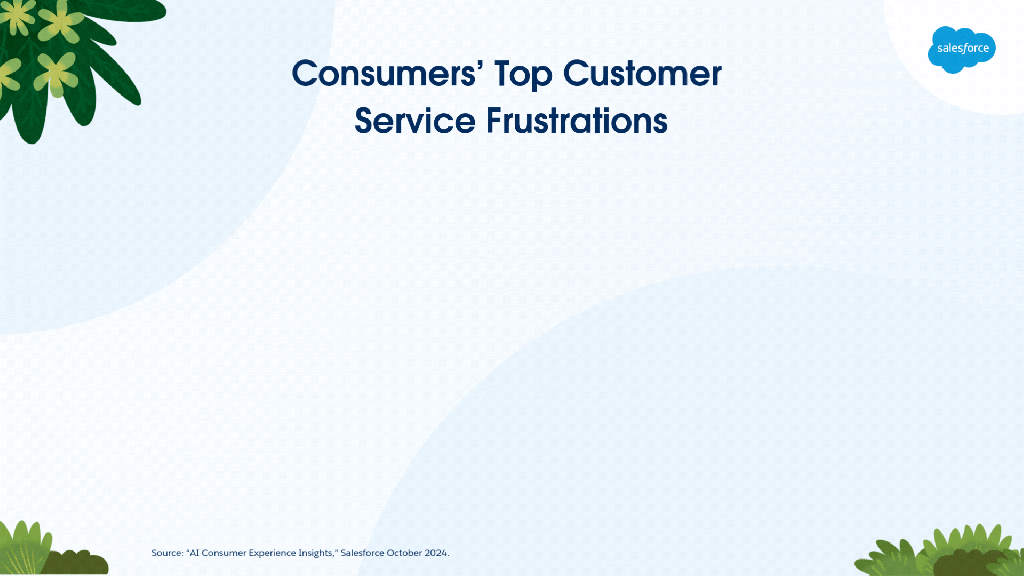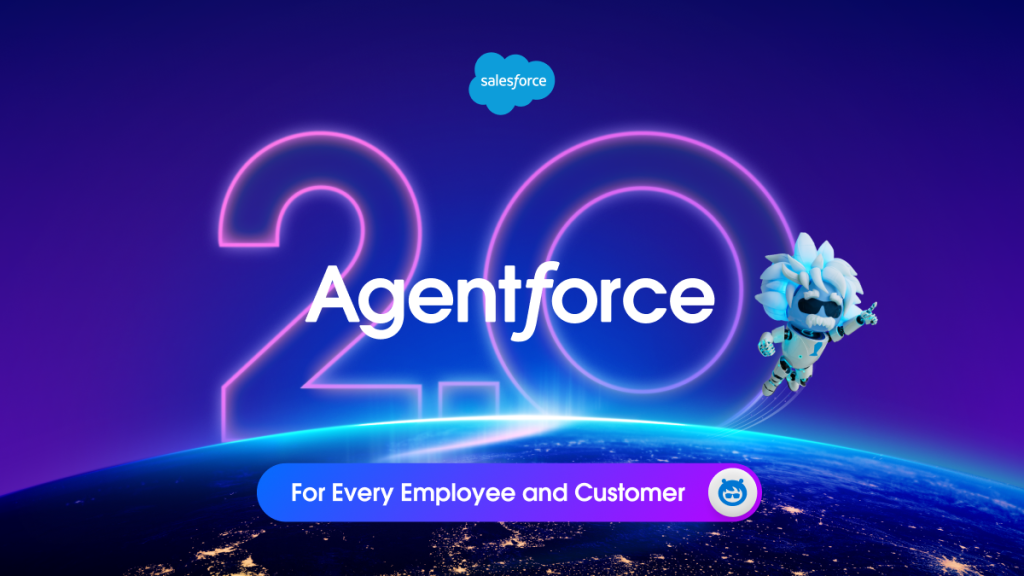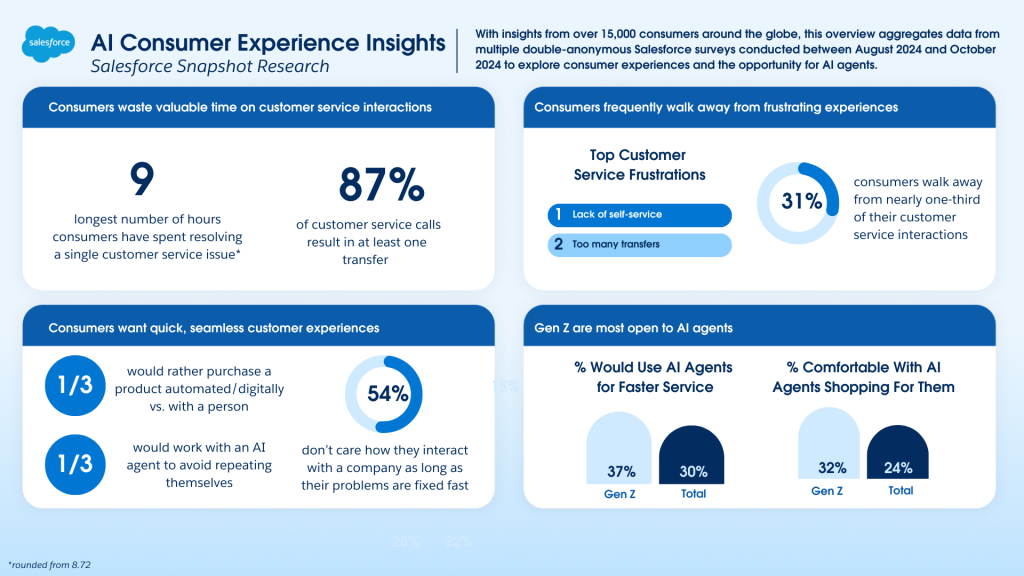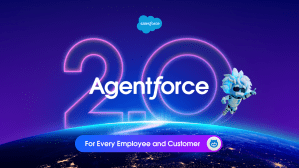“The agent revolution is real and as exciting as the cloud revolution… the social revolution, the mobile revolution,” Salesforce Chair and CEO Marc Benioff said recently. “It will provide a level of transformation that we’ve never seen.”
With the announcement that Agentforce is now generally available, the era of AI agents is officially here. AI agents, a new type of software built to perform work with varying degrees of autonomy, can now work seamlessly together with humans to drive real impact.
Agents are already being used in companies around the world, showing the power of this technology to drive customer success. Wiley, for example, has seen a more than 40% increase in case resolution with Agentforce, outperforming their old bot. Read more on agent ROI from Saks, Opentable, and Wiley.
Salesforce research highlighting perspectives from consumers, desk workers, business leaders, and more across North America, Europe, the Middle East, and Asia-Pacific regions, help to support Benioff’s sentiments and highlight the opportunity for AI agents. The statistics are an aggregate of Salesforce proprietary data points, highlighting customer and employee perspectives and pain points in a variety of industries. These challenges also show opportunities — specifically, where AI agents can drive the greatest improvements for both consumers and enterprises.
For audience-specific insights on AI agents, click the relevant section below:
Why consumers need agents
Consumers have become increasingly frustrated with the time they waste navigating traditional customer service channels. Being transferred multiple times and repeating their issues to different representatives often leads to abandonment and dissatisfaction:
- U.S. consumers estimate they are transferred at least once during 87% of their customer service interactions.
- Two out of three consumers (67%) are frustrated when customer service can’t resolve their issues instantly.
- Customers walk away from nearly one-third of their customer service interactions without getting what they need.
- On average, the longest time U.S. consumers claim to have spent trying to resolve a single issue with customer service is nine hours — longer than a workday.
AI and agents are emerging as solutions to these challenges. With their ability to provide immediate, personalized assistance, AI agents can significantly reduce wait times and the need for multiple transfers. Research shows a growing openness to this technology, particularly among Gen Z consumers who are eager to embrace innovative solutions for a more seamless and efficient customer service experience:
- 54% of consumers don’t care how they interact with a company, as long as their problems are fixed fast.
- In fact, one-third of consumers would rather purchase a product automated/digitally (e.g., through AI agents) vs. with a person.
- 39% of consumers are already comfortable with AI agents scheduling appointments for them.
- Nearly one-fifth (24%) of consumers are already comfortable with AI agents shopping for them. And 32% of Gen Z consumers are already comfortable with AI agents shopping for them.
- Over a third (34%) of consumers would work with an AI agent instead of a person to avoid repeating themselves.
- 37% of consumers are already comfortable with AI agents creating more personalized/useful content for them.
- 44% of Gen Z consumers are comfortable with AI agents creating more personalized/useful content for them.
Why enterprises need agents
Enterprises have an efficiency problem. Workers spend most of their time on time-consuming tasks — tasks agents could help alleviate — instead of focusing on customer relationship-building activities.
- Salespeople spend 71% of their time on non-selling tasks (like administrative tasks and manually entering data).1
- Service reps spend 66% of their time on non-customer facing tasks (like administrative tasks and manually entering data).2
- 85% of customer service reps at organizations who use AI say it saves them time.3
Agentforce is here.
AI implementation is a top priority across marketing and ecommerce teams. And when done correctly, AI has a proven contribution to revenue and cost reduction across enterprises.
- Marketing4 and ecommerce5 teams say AI implementation is their #1 priority.
- 83% of sales teams with AI saw revenue growth in the past year — versus 66% of teams without AI.6
- 76% of ecommerce teams with AI credit it with revenue growth.7
- 92% of service teams with AI say it reduces their costs.8
According to Salesforce experts, AI has already proven its value across service, sales, marketing, and commerce but businesses have barely scratched the surface of its potential.
By embracing an agent-first approach, every business can redefine their operations and stay ahead – right now.
Adam Evans, SVP Product, Salesforce AI Platform
“We’re at a pivotal moment where every business, CEO, manager, and employee has the chance to reimagine what it means to get work done,” said Adam Evans, SVP Product, Salesforce AI Platform. “By embracing an agent-first approach, every business can redefine their operations and stay ahead – right now.”
More information:
- Read how Agentforce is delivering trusted, autonomous AI agents at scale
- Learn how agents are transforming our lives in practical ways
- Dive into how Agentforce is inventing the future of agents
1 Salesforce State of Sales, July 2024
2 Salesforce State of Service, April 2024
3 Salesforce State of Service, April 2024
4 Salesforce State of Marketing, May 2024
5 Salesforce State of Commerce, January 2024
6 Salesforce State of Sales, July 2024
7 Salesforce State of Commerce, January 2024
8 Salesforce State of Service, April 2024






















